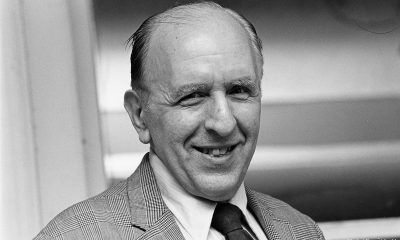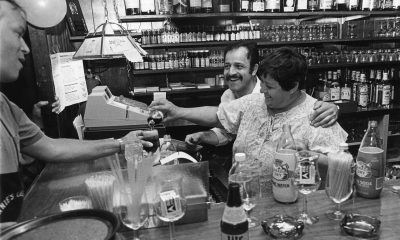Local
Frank Kameny’s sole heir speaks out
Housemate, friend of 19 years was ‘family member’ unknown to gay leader’s associates
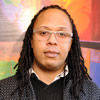
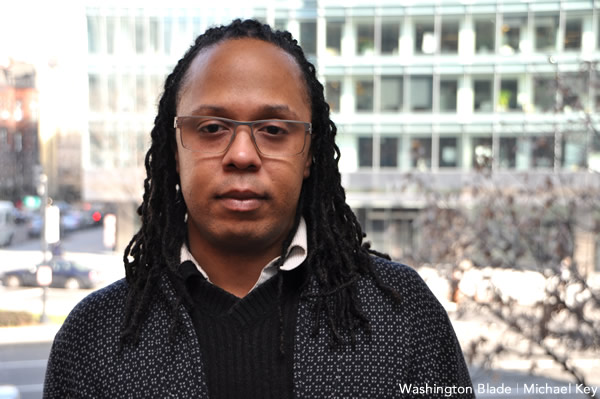
Timothy Clark, 35, was named the sole beneficiary of Frank Kameny’s estate except for his papers, which Kameny bequeathed to the Library of Congress. (Washington Blade photo by Michael Key)
Editor’s note: This is the first installment of a two-part report. Next week: More on Timothy Clark and his long association with Frank Kameny.
While nationally acclaimed gay rights pioneer Franklin E. Kameny collaborated in his later years with fellow activists and national politicians and attended events at the White House, Timothy Lamont Clark says he prepared Kameny’s breakfast and dinner in the privacy of Kameny’s home.
Virtually unknown to Kameny’s circle of friends and political associates in the LGBT rights movement, Kameny named Clark, 35, in his will as the sole beneficiary of his estate except for his papers, which he bequeathed to the Library of Congress.
He also named Clark in the will, filed in 2007, as the personal representative of his estate, a position similar to an executor that has full authority to decide how the estate’s assets and possessions should be managed.
Kameny died in October 2011, leaving behind what LGBT activists and civil rights leaders who knew him called a 50-year legacy as one of the nation’s preeminent architects and advocates for LGBT equality.
Clark says he began a 19-year friendship with Kameny when he was 15 years old, after calling the Gay Information hotline that Kameny operated out of his home in 1991.
Clark says he was living with his grandmother in Southeast D.C. at the time and was struggling to come out as gay in a deeply religious extended family. Through an odd turn of events, his grandmother learned that Clark had been speaking to Kameny by phone on a regular basis a few months after Clark first called the hotline, which he had discovered in the Yellow Pages.
“That’s when my grandmother called Frank,” he said in an exclusive interview with the Washington Blade on Tuesday. “At first it was a heated conversation. But then once they got past that, my grandmother said on no uncertain terms you will not be able to see my grandson until his 16th birthday.”
He continued to speak with Kameny by phone in what he describes as a counselor and mentor type relationship. Shortly after his 16th birthday Clark says he met Kameny in person for the first time in a public library while accompanied by his grandmother.
“After that, my grandmother allowed me to talk to Frank,” Clark said. “It was nothing that was hidden anymore… And Frank has been part of my life ever since then.”
Clark added, “And that’s when my grandmother started asking him, do you think that him being this way, is it safe for him to go to Anacostia High School? And Frank said yes. It was like everything had collided in a good way between all parties involved.”
Among the things Clark talked to Kameny about in the ensuing years was his relationship with his boyfriend, who moved in with him at his grandmother’s house around 1997 after the boyfriend encountered problems with his parents, who were members of the Jehovah’s Witness faith.
Although his grandmother was gradually becoming more accepting of him being gay, Clark said she wasn’t quite ready for him to cohabitate with a boyfriend in her house. With his grandmother’s consent, Clark accepted an offer by Kameny to move into Kameny’s basement apartment at Kameny’s house on Cathedral Avenue, N.W.
In addition to being a good friend, Clark knew that, unlike his grandmother, Kameny would have no problem accepting Clark’s boyfriend.
“So I moved over there in his basement until 1999 and then me and my boyfriend moved out to Centerville, Va., Clark said. “So I was there from ’97 to ’99 before I moved out.”
Clark said he moved back into Kameny’s house between 2002 and 2003 after having moved from Centerville to an apartment in D.C. By then his friendship with Kameny deepened and evolved into a family type relationship, with Kameny spending time at his grandmother’s and relatives’ homes on holidays, including Christmas and Thanksgiving dinners, Clark said.
“Frank was a part of my family,” he said. “Frank was like a grandfather to me. My grandfather passed away when I was little, but Frank was literally like a grandfather to me. We had our ups and downs, but that’s what families do.”
Clark said his return to Kameny’s house came at Kameny’s request and caused a strain on his relationship with his boyfriend.
“He just called me and said that he was getting older and he missed me living there and he would like for me to come back,” Clark said. “So that’s when my aunt, who knew Frank, that’s when she got someone to redo the basement because the basement by then was in horrible condition and I couldn’t come back there like that.”
As the basement was being fixed up through contractors hired and paid for by his aunt, Clark said Kameny sat him down to discuss the situation.
“He said Timothy, you know I’ve always been self-sufficient and I never needed anybody around, but when you were here I found comfort and I would like to have you back if you’re willing to come back.”
While mulling over Kameny’s invitation to return, Clark said he and his boyfriend had a separate conversation. “That’s when my partner said, well, it’s me or the old man. I chose Frank because Frank was very important to me,” said Clark. “He helped me get over things in my personal life, you know, a lot of things. He helped me get through the anger I had towards a lot of the women in my family,” whose religious beliefs often were at odds with his sexual orientation, Clark said.
“Frank really helped me get past all of that.” Pausing and appearing to hold back tears, Clark said, “Frank is — oh — he was just awesome.”
Clark lived in the basement apartment until after Kameny’s death.
Collard greens and chitlins
Describing himself as a “very private” person, Clark said he shunned the political and LGBT activist world that Kameny relished, despite Kameny’s frequent requests that he attend various events and celebrations. It was only in the last few years of Kameny’s life that Clark said he began attending the city’s LGBT Pride parade as it passed around Dupont Circle.
Instead, he says he has fond memories of Kameny’s participation in his family events, including holiday dinners.
“When my grandmother’s sister from North Carolina came up he went over there to meet her with me at my cousin’s house,” Clark recalls. “It was just so funny because he knew my grandmother but when he first came to one of the dinners and my grandmother had collard greens and chitlins, I said Frank I want you to finish your plate for everything,” Clark said.
“My grandmother asked him to call her by her first name, Lena,” he said. “And Frank said, Lena, what is this? And she said chitlins [pig intestines prepared in a traditional Southern recipe]. And Frank sat back and said Lena what does an old Jew from New York know about this? We all just laughed, and he ate the chitlins. And ever since then he would always ask if my grandmother was making chitlins for the holidays.”
Clark said his fond memories of Kameny’s role as a welcomed member of his family became marred to some degree following Kameny’s death when rumors began circulating among some of Kameny’s political friends and acquaintances over the nature of his relationship with the famed gay rights leader. Some wondered why he would be named as the main beneficiary in Kameny’s will, giving him Kameny’s house, which the city’s tax office says has an assessed value of $730,880.
Clark said earlier rumors that surfaced in the year prior to Kameny’s death were even more unsettling. Clark said he was stunned last year when two D.C. police officers, a staff member from gay D.C. Council member David Catania (I-At-Large), and a D.C. government official specializing in senior citizen services came to Kameny’s house to talk to him and Kameny separately over concerns by people who knew Kameny that Clark was “abusing” him and may have been arrested in the past for allegedly assaulting Kameny.
Glen Ackerman, who is serving as Clark’s attorney on matters related to Kameny’s estate, said he conducted a search of D.C. court records and confirmed “there is absolutely no truth whatsoever to these ugly rumors.”
The Blade also checked court records and determined Clark had never been charged with an offense in connection with his relationship with Kameny.
Ackerman said that as hurtful as the rumors are to Clark, he believes they were spawned, in part, over the fact that Clark was an unknown figure to virtually all of Kameny’s activist friends and acquaintances. He said he advised Clark to speak to the Blade, among other things, to dispel the mystery surrounding him.
“The only story that’s relevant here is that out of everyone that Dr. Kameny knew in his life, he only trusted one person in terms of his estate and that’s Timothy Clark,” Ackerman said. “With everyone in his life, he trusted this one man to be his personal representative at his death and to leave him basically all of his earthly possessions, including but not limited to his home, his automobile and all of his possessions with the exclusion of his papers that would go to the Library of Congress.”
Ackerman said that officials with the Kameny Papers Project, who had helped arrange for the donation of Kameny’s life’s work writings on behalf of LGBT rights to go to the Library of Congress, initially had not consulted Clark about plans to have Kameny’s ashes buried on March 3 in D.C. Congressional Cemetery.
“He has the sole authority to decide the destiny of all of Dr. Kameny’s possessions, including his ashes,” Ackerman said.
Clark, who initially planned to take possession of Kameny’s ashes, said he has agreed to allow half of the ashes to be buried in the planned March 3 memorial ceremony at Congressional Cemetery while keeping the remaining half “to cherish for the rest of my life.”
Clark said his grief over Kameny’s death brought back memories of the death of his grandmother in 2008, who Kameny knew and loved. When he received a phone call while at home with Kameny that his grandmother had died, Clark said he walked outside on the front lawn to collect his thoughts.
“Frank came downstairs and outside,” he said. “I was standing on the grass. He came out and hugged me and said I’m still here for you, I’m still here. I’ll never forget that day.”
He said he and several of his relatives plan to attend the March 3 burial ceremony for Kameny’s ashes.
District of Columbia
Reenactment of first gay rights picket at White House set for April 17
Event marks 59th anniversary of historic push for gay rights in nation’s capital
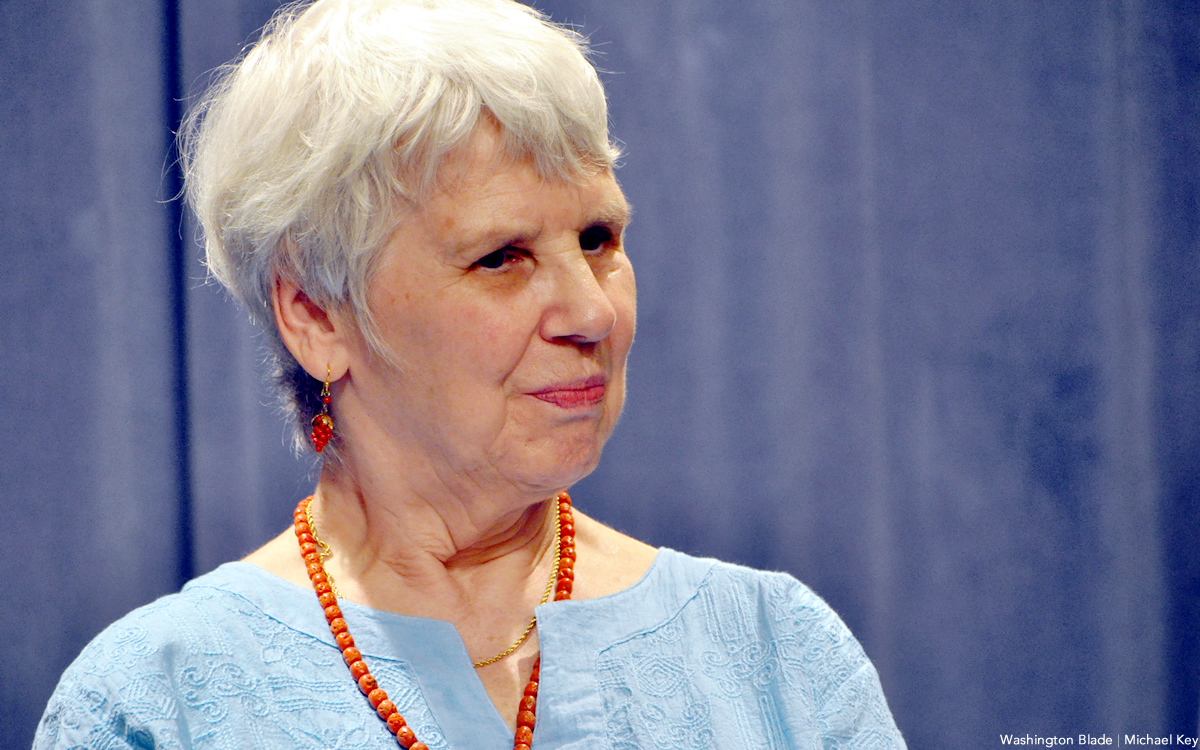
D.C.’s Rainbow History Project announced it will hold a reenactment on Wednesday, April 17, of the historic first protest for gay rights in the form of a picket line in front of the White House that took place on that same day in 1965.
In a statement released last week, Rainbow History Project says the reenactment will mark the 59th anniversary of an event that is credited with bringing attention for the first time to the federal government’s longstanding discrimination against a minority group referred to then as homosexuals or gays and lesbians.
The statement notes that the 1965 event was organized by the Mattachine Society of Washington, D.C., the first politically active LGBT organization in the nation’s capital founded by local gay rights pioneer Frank Kameny.
“The picket took place on the White House sidewalk, Lafayette Park, 1600 Pennsylvania Ave., on April 17, 1965,” the statement says. “For exactly one hour, from 4:20 p.m. to 5:20 p.m., members of the Mattachine Society of Washington walked in a circle, non-stop, in silence, carrying posters of their demands,” the statement continues.
“The White House picket is the origin story for public demonstrations for gay rights in the U.S., and the origin story for Pride Marches and the annual LGBTQ Pride celebrations which occur across the globe,” according to the statement.
It says those picketing in the April 1965 event, which included Kameny and longtime local D.C.-area lesbian activist Lilli Vincenz, both of whom held doctorate degrees, called on the government to adopt the Mattachine Society of Washington’s four major demands: an end to the exclusion of homosexuals from federal government employment; an end to the ban on gays and lesbians from serving in the U.S. military; an end to the “blanket denial” of security clearances for gay people; and an end to the “government refusal to meet with the LGBTQ community.’
Among those who chose not to respond to the request for a meeting was President Lyndon B. Johnson, who occupied the White House at the time of the 1965 picketing.
Vincent Slatt, the Rainbow History Project’s director of archiving and one of the lead organizers of the April 17 reenactment event, said the event is aimed, among other things, at drawing attention to how far the LGBTQ community has come since 1965. He said the event is not in any way a protest of the administration of President Joe Biden and Vice President Kamala Harris, who Slatt called staunch supporters of the LGBTQ community.
“We are just reenacting this historical event and pointing out how far we’ve come,” Slatt told the Washington Blade. “If you think about what it means in 1965 when these people were protesting and LBJ would not even respond to them. And now, we are at a place where Vice President Harris speaks on a stage at Capital Pride.”
The Rainbow History Project statement notes that the reenactment event will also be held in honor of Kameny, who died in 2011, and Vincenz, who passed away in 2023, both of whom participated in a similar reenactment event in 2008.
Among those who will be participating in this week’s reenactment on April 17 will be longtime local LGBTQ rights activist Paul Kuntzler, who is the only known surviving person who was among the White House picketers at the April 1965 event. Kuntzler will be carrying a replica of his own picket sign he held at the 1965 event, the statement says.
It says Rainbow History Project volunteers will also carry replicas of the original protest signs and hand out literature explaining the picket to passersby and tourists.
Similar to the 1965 event, the reenactment picketing at the White House will begin on April 17 at about 4:15 p.m., according to Slatt of the Rainbow History Project.
District of Columbia
Four LGBTQ candidates running for delegate to Democratic National Convention from D.C.
Thirty-two candidates competing for 13 elected delegate positions in April 20 party caucus
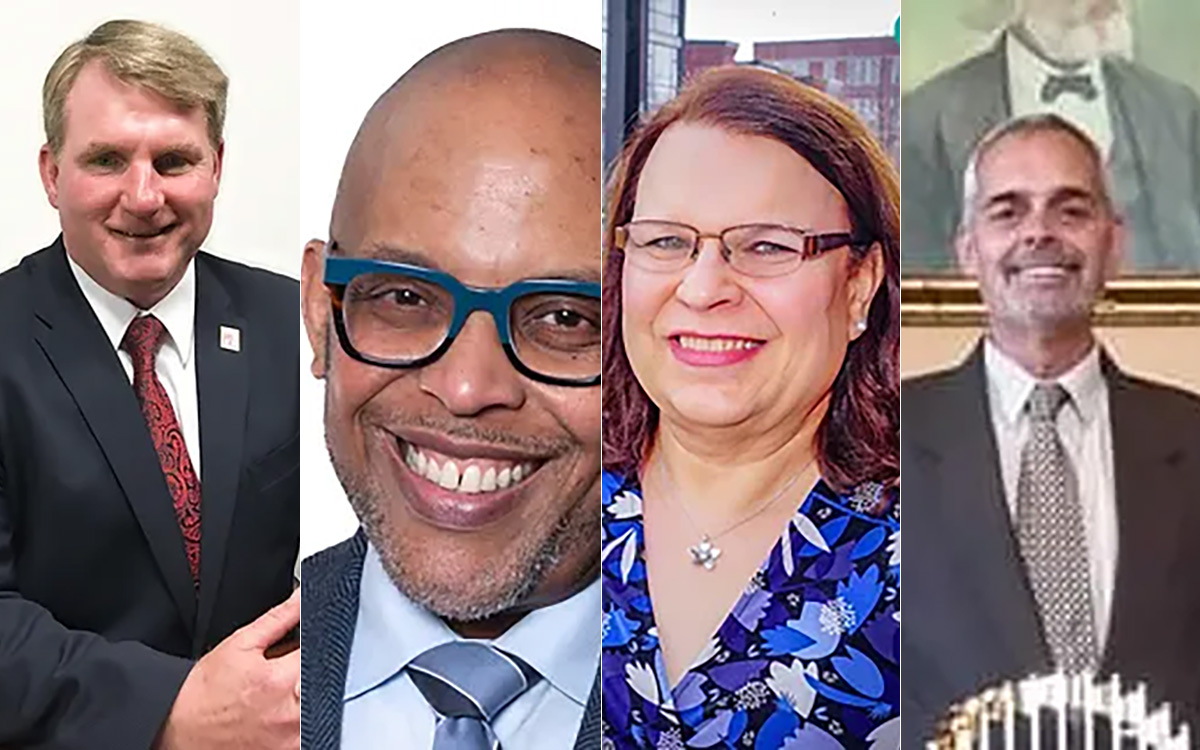
Four LGBTQ Democratic Party activists are running for election as delegates from D.C. to the Democratic National Convention at an April 20 local Democratic Party caucus election in which all D.C. voters who are registered as Democrats will be eligible to vote.
The four LGBTQ candidates are among 32 candidates competing for just 13 elected delegate positions. D.C. will have a total of 51 delegates to the Democratic Convention, but the other 38 include elected officials and party leaders who are considered “automatic” or appointed delegates. The convention will be held in Chicago Aug. 19-23,
Under the delegate selection process put in place by the D.C. Democratic Party, six of the thirteen elected delegate positions will be elected by voters in a section of the city designated as District 1, which includes Wards 1,2, 6, and 8. The other seven elected delegates will be chosen by voters in District 2, which includes Wards 3, 4, 5, and 7.
The LGBTQ candidates include longtime gay Democratic activists David Meadows of Ward 6 and John Fanning of Ward 2 who are running in District 1. Transgender rights advocate and Democratic Party activist Monika Nemeth of Ward 3 and gay Democratic activist Jimmie Williams of Ward 7 are running in District 2.
All four of the LGBTQ candidates have been active members of the Capital Stonewall Democrats, one of D.C.’s largest LGBTQ political organizations. Nemeth and Meadows are past presidents of the organization. Williams has served as chair of the Ward 7 Democratic Committee and is a current member of the committee. Fanning has served as an elected member of the D.C. Democratic State Committee from Ward 2 and served as a delegate to the 2016 Democratic National Convention.
A total of 12 candidates are running in each of the two districts. Under party rules the highest six vote getters in District 1 and the highest 7 vote getters in District 2 will be declared the winners.
The Saturday, April 20 caucus election for the delegate candidates will take place at the Walter E. Washington D.C. Convention Center. An announcement by party officials says two voting sessions will take place, one from 10:00 a.m. to 2:00 p.m. and the other from 4:00 p.m. to 8:00 p.m.
Aside from the elected delegates, two prominent D.C. LGBTQ Democratic leaders will be appointed as delegates to the 2024 Democratic National Convention in their role as members of the Democratic National Committee from D.C.
They are Claire Lucas, a highly acclaimed Democratic Party and LGBTQ rights advocate and party fundraiser; and Earl Fowlkes, one of the lead organizers of D.C.’s annual Black LGBTQ Pride celebration and former president of Capital Stonewall Democrats.
Lucas and Fowlkes and the four LGBTQ candidates running in the April 20 caucus election are committed to backing President Joe Biden as the Democratic nominee for re-election.
Statements from each of the candidates running for delegate in the April 20 caucus election, including the four LGBTQ candidates, can be accessed here: Candidates for Delegate | DC Democratic Party
District of Columbia
HIPS D.C. launches ‘Harm Reduction’ vending machine program
LGBTQ supportive group says program aimed at ‘saving lives’ in response to overdose crisis
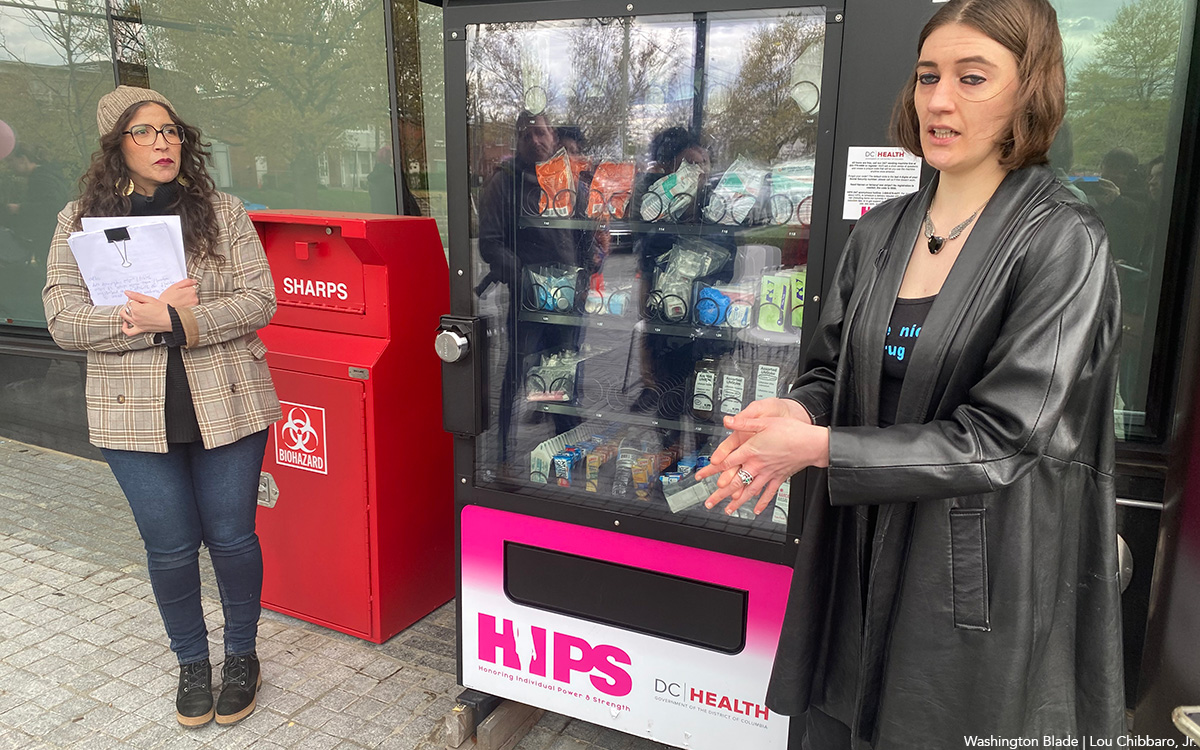
HIPS D.C., the LGBTQ supportive organization that provides support and services for drug users and sex workers, officially launched on April 5 a ‘Harm Reduction Vending Machine Pilot Program’ that it says will help save lives by providing free of charge harm reduction supplies for drug users in locations where there is a “higher than average” rate of overdose cases.
The announcement of the project was held outside the Whitman-Walker Health Max Robinson Center building at 1201 Sycamore Dr., S.E., next to where one of the first three HIPS vending machines is located.
Alexandra Bradley, HIPS’ Outreach and Community Engagement Manager, told a small gathering at the announcement event that among the supplies provided free of charge through the vending machines are naloxone, the life-saving nasal spray medication used to treat an opioid drug overdose; fentanyl test kits, syringes, and syringe wound care kits; drug snort kits, condoms, and other items, including water bottles and snack food such as crackers and granola bars.
Bradley and other officials with HIPS and Whitman-Walker Health said they believe most people, when informed of the rationale behind the vending machines and other programs supporting drug users, will understand that the programs are not encouraging drug use.
“People will use drugs,” Bradley said. “We want them to use them safely,” she added, with the hope that they will seek support to get off drugs. “We can’t help anybody if they are dead. We want to keep people safe,” Bradley said.
A statement released by HIPS says the vending machine pilot program is being funded by a grant from the D.C. Department of Health. It says anyone can access the machines free of charge by contacting HIPS through a phone number posted on the machines – 202-779-0486 – to obtain a four-digit participant code “that they will then punch in to use the machines.” It says that as of April 5, 150 individuals had already registered and enrolled in the program.
Bradley pointed out that registration is not required to obtain naloxone supplies, which can be obtained through a code number posted on the machines. She said each of the three machines are also accompanied by a metal disposal receptacle for safely placing used syringes.
“These machines have been placed in areas where there are higher concentrations of overdose deaths and/or underserved areas with high levels of need for access to services and supplies,” the HIPS statement says.
In addition to the HIPS vending machine at the site of Whitman-Walker’s Max Robinson Center, the second HIPS vending machine is located at The Michelle Obama Southeast Center of Bread for the City at 1700 Marion Barry Avenue, S.E., and the third one is located at Bread for the City’s Shaw neighborhood facility at 1525 7th Street, N.W.
The announcement of the vending machine harm reduction project comes at a time when many in the D.C. LGBTQ community have mourned the loss of beloved local LGBTQ members from a drug overdose, including accidental drug overdoses caused by contamination of their preferred drug such as cocaine with fentanyl.
Also speaking at the announcement event was Andrea Lopez, an Associate Professor at the University of Maryland’s Department of Anthropology, which she said is partnering with HIPS to conduct a study of the vending machine pilot program and its impact as a public health project and the public health benefits of vending machines as an “intervention” in support of those in need.
Others who spoke at the event and provided details of the vending machine project were Cyndee Clay, the HIPS Executive Director; Starr O’Leary, the HIPS Community Outreach Coordinator; and Jona Tanguay, an official with Whitman-Walker Health.
-

 Opinions5 days ago
Opinions5 days agoNetanyahu must go!
-

 LGBTQ Non-Profit Organizations5 days ago
LGBTQ Non-Profit Organizations5 days agoDay of [no] silence, a call to speak out against anti-LGBTQ+ hate
-

 Colorado3 days ago
Colorado3 days agoFive transgender, nonbinary ICE detainees allege mistreatment at Colo. detention center
-

 Africa1 day ago
Africa1 day agoCongolese lawmaker introduces anti-homosexuality bill



